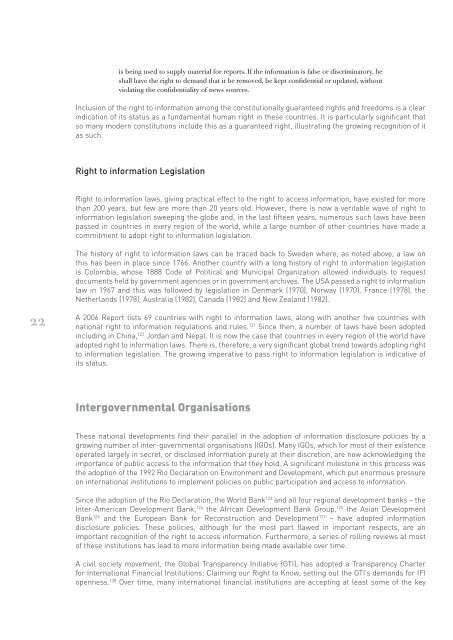Freedom of Information: A Comparative Legal Survey - Federation of ...
Freedom of Information: A Comparative Legal Survey - Federation of ...
Freedom of Information: A Comparative Legal Survey - Federation of ...
Create successful ePaper yourself
Turn your PDF publications into a flip-book with our unique Google optimized e-Paper software.
22<br />
is being used to supply material for reports. If the information is false or discriminatory, he<br />
shall have the right to demand that it be removed, be kept confi dential or updated, without<br />
violating the confi dentiality <strong>of</strong> news sources.<br />
Inclusion <strong>of</strong> the right to information among the constitutionally guaranteed rights and freedoms is a clear<br />
indication <strong>of</strong> its status as a fundamental human right in these countries. It is particularly signifi cant that<br />
so many modern constitutions include this as a guaranteed right, illustrating the growing recognition <strong>of</strong> it<br />
as such.<br />
Right to information Legislation<br />
Right to information laws, giving practical effect to the right to access information, have existed for more<br />
than 200 years, but few are more than 20 years old. However, there is now a veritable wave <strong>of</strong> right to<br />
information legislation sweeping the globe and, in the last fi fteen years, numerous such laws have been<br />
passed in countries in every region <strong>of</strong> the world, while a large number <strong>of</strong> other countries have made a<br />
commitment to adopt right to information legislation.<br />
The history <strong>of</strong> right to information laws can be traced back to Sweden where, as noted above, a law on<br />
this has been in place since 1766. Another country with a long history <strong>of</strong> right to information legislation<br />
is Colombia, whose 1888 Code <strong>of</strong> Political and Municipal Organization allowed individuals to request<br />
documents held by government agencies or in government archives. The USA passed a right to information<br />
law in 1967 and this was followed by legislation in Denmark (1970), Norway (1970), France (1978), the<br />
Netherlands (1978), Australia (1982), Canada (1982) and New Zealand (1982).<br />
A 2006 Report lists 69 countries with right to information laws, along with another fi ve countries with<br />
national right to information regulations and rules. 121 Since then, a number <strong>of</strong> laws have been adopted<br />
including in China, 122 Jordan and Nepal. It is now the case that countries in every region <strong>of</strong> the world have<br />
adopted right to information laws. There is, therefore, a very signifi cant global trend towards adopting right<br />
to information legislation. The growing imperative to pass right to information legislation is indicative <strong>of</strong><br />
its status.<br />
Intergovernmental Organisations<br />
These national developments fi nd their parallel in the adoption <strong>of</strong> information disclosure policies by a<br />
growing number <strong>of</strong> inter-governmental organisations (IGOs). Many IGOs, which for most <strong>of</strong> their existence<br />
operated largely in secret, or disclosed information purely at their discretion, are now acknowledging the<br />
importance <strong>of</strong> public access to the information that they hold. A signifi cant milestone in this process was<br />
the adoption <strong>of</strong> the 1992 Rio Declaration on Environment and Development, which put enormous pressure<br />
on international institutions to implement policies on public participation and access to information.<br />
Since the adoption <strong>of</strong> the Rio Declaration, the World Bank 123 and all four regional development banks – the<br />
Inter-American Development Bank, 124 the African Development Bank Group, 125 the Asian Development<br />
Bank 126 and the European Bank for Reconstruction and Development 127 – have adopted information<br />
disclosure policies. These policies, although for the most part fl awed in important respects, are an<br />
important recognition <strong>of</strong> the right to access information. Furthermore, a series <strong>of</strong> rolling reviews at most<br />
<strong>of</strong> these institutions has lead to more information being made available over time.<br />
A civil society movement, the Global Transparency Initiative (GTI), has adopted a Transparency Charter<br />
for International Financial Institutions: Claiming our Right to Know, setting out the GTI’s demands for IFI<br />
openness. 128 Over time, many international fi nancial institutions are accepting at least some <strong>of</strong> the key
















